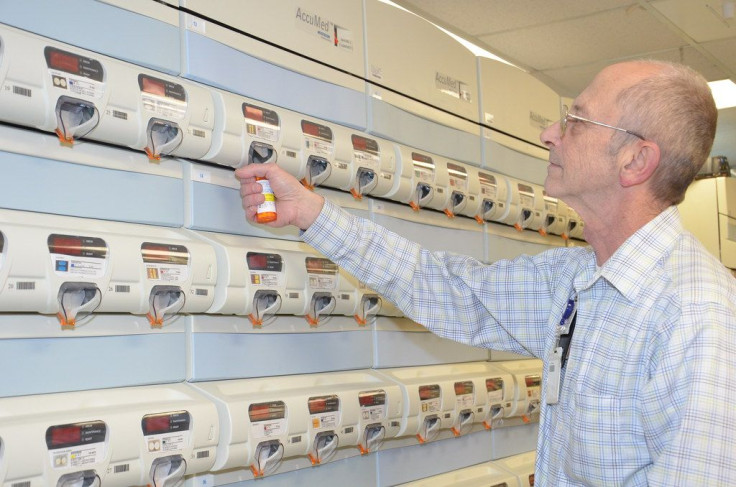The Canadians Are Putting the Kibosh on Trump’s Drug Import Plan

The Canadian Health minister signed an order last week that will curb the ability of Americans to import prescription drugs from our neighbors to the north.
The order from Health Minister Patty Hajdu, limiting the bulk export of prescription drugs, came just days before the Department of Health and Human Services’ new rule allowing pharmacists or wholesalers to import certain prescription drugs in bulk went into effect on Monday.
“ Our health care system is a symbol of our national identity and we are committed to defending it," Hajdu said in a statement, according to NPR . "The actions we are taking today will help protect Canadians' access to the medication they rely on.”
Under the order, the Canadian government will not sell prescription medications if the sale would cause or worsen a drug shortage in Canada, NPR reported. At any given time, 10 to 15% of drugs are in shortage in Canada, according to NPR. With the Covid-19 pandemic, there is a growing demand for certain drugs. In October there were 42 serious shortages of drugs in the country, compared to 10 shortages in all of 2019.
The Health Ministry order did not specifically name a group or class of drugs that would be excluded from export. It only said that the order will apply to drugs that are subject to shortage reporting, according to NPR. That group would include prescription medicines and controlled substances.
“It does not apply to over-the-counter drugs or to drugs manufactured in Canada or imported solely for the purpose of export,” Health Canada spokesperson Anna Maddison told NPR.
When announcing the new rule In September, President Donald J. Trump called it “a game-changer for American seniors,” according to Kaiser Family News. “We’re doing it very, very quickly.” In early November, the president said the new rule would reduce the cost of prescription medications in half by cutting out middlemen who jack-up prices, according to NPR.
But from the time the new rule was announced in September, Canadian politicians have made it clear that the country would not comply with the program because it did not have the prescription medication to spare. Many Canadian pharmacists and distributors pledged not to participate in the Trump administration’s plan.
Prescription medicines are cheaper in Canada because the government limits what drug manufacturers can charge. And for years, Americans have crossed the border to buy medications from Canadian-regulated pharmacies even though it was illegal. The US government generally looked the other way for personal use purchases.
Under the president’s plan, a Canadian-licensed wholesaler would buy medications approved for sale in Canada from a pharmaceutical company, then export the drugs to a US importer. The importer would then contract with a state, which would then dispense the drugs to pharmacies.
One state that has submitted an importation plan to the federal government is Florida. The plan, approved by the state legislature in 2019, will be administered by Florida’s Agency for Health Care Administration.
“For far too long, Floridians have been paying exorbitant prices for prescription drugs,” Governor Ron DeSantis said in a Monday press release reported by the Tampa Bay Times. “Today we take another step towards lowering those prices.”
But a pharmaceutical lobbying group has filed a lawsuit in federal court to stop Florida and other states from importing prescription medications from Canada. The Pharmaceutical Research and Manufacturers of America (PhRMA), one of the groups suing the administration, said that the program has not proven that it will be safe and effective, two requirements of the new rule.
“Every secretary that has looked at this in the past 20 years, Republican or Democrat, has said, I can’t certify to either” cost of safety, James C. Stansel, executive vice president and general counsel for PhRMA told the Tampa Bay Times.
The American Pharmaceutical Association (APhA) told Medical Daily in an interview last month, that it opposes the president's order for several reasons, safety being first and foremost.
“Nothing in the final regulation and other supporting documents that the FDA (Food and Drug Administration) published demonstrates that this can be done safely and will result in savings for patients,” Illisa Bernstein, APhA’s senior vice president for pharmacy practice and government affairs, said.
The main concern, Ms. Bernstein said, was that drugs would change hands several times between the Canadian wholesaler and the local American pharmacy counter. That could allow drugs to be relabeled and added to the importer’s supply chain, which includes drugs from other countries. It is possible, she said, that when someone picks up a prescription, the contents won’t be the FDA-approved version, but a counterfeit drug.
“There is very little information HHS has given about that, and that poses even more significant risks,” she said. “You don’t know what you’re getting from the global supply chain.”
When it released Florida’s plan, DeSantis’ office said that it would put measures in place that would “ensure counterfeit drugs do not enter the supply chain,” according to the Tampa Bay Times.
Robert Calandra is an award-winning journalist and book author who has written extensively about health and medicine. His work has appeared in national and regional magazines and newspapers.



























